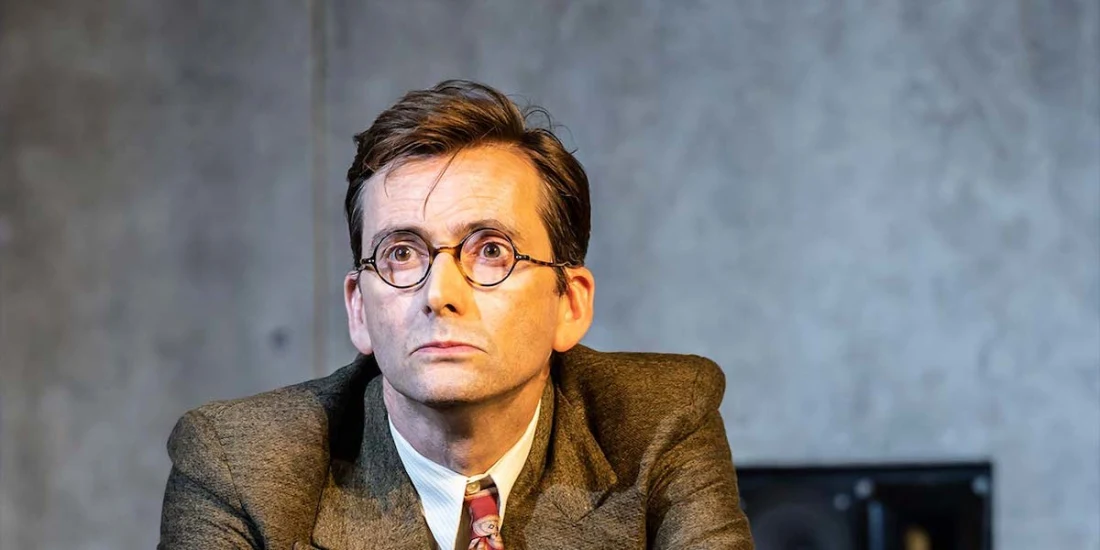'Good' review – David Tennant is chilling as a professor who drifts into Nazism
What would it take for a seemingly good man to be seduced by such a vile ideology as Nazism – to the point of becoming an SS officer and an active participant in its worst atrocities? That’s the premise of CP Taylor’s 1981 play Good, now revived in the West End with David Tennant playing the susceptible Halder.
It’s an urgent question that we are all facing in a time where the far right is once again resurgent, as is anti-Semitism, and democratic norms are being eroded across the world. Dominic Cooke has mounted a pacey production, and Tennant is joined by two excellent co-stars in Sharon Small and Elliot Levey. However, Taylor’s play keeps us at arm’s length before finally gripping in a stronger second half.
Halder is a literature professor in 1930s Frankfurt with a wife and three kids, and a mother with visual impairment and advanced dementia. He’s a bit of a loner – Jewish psychiatrist Maurice is his only friend – and he expresses his frustrations with caring for his mother in a pro-euthanasia novel (which Hitler later praises as being written “from the heart”). He begins an affair with his young student, Anne, while also becoming involved with the Nazi Party.
Taylor’s big dramatic idea is to demonstrate Halder’s fatal detachment from reality – which suits the Nazi purpose, as he is able to distance himself from humanity to the extent of extermination – by having him constantly hear music. So he might be talking to Maurice, but he’s also listening to a dance band and carrying on an internal monologue. Maurice doesn’t quite seem real to him; no one else does, except perhaps Anne. The music turns iconvenient reality into fantasy.
Taylor makes the sinister point that it’s passivity, rather than an active enthusiasm for evildoing, that is the real insidious force in society – people turning a blind eye to the persecution of others if it makes their own lives better. Halder personifies that, drifting into horrors while finding a new justification for each step; his casual moral equivocation is chilling.
It’s a harrowing demonstration of how quickly we can adjust to “the new normal” – like Halder and Anne carrying out a loving domestic conversation while she helps him into his SS uniform – and the banality of evil, like Halder sighing when he's summoned for Kristallnacht because he was happily pottering in the garden. Plus there’s an extra charge in this production – with all the actors using their natural accents – from the casting of lovable Doctor Who star David Tennant; surely he could never become a Nazi officer?
But because we spend much of the play essentially in Halder’s mind, switching between past and present, memories and ponderings, the audience is also detached from the supporting characters, who only appear in brief snapshots. That issue is exacerbated by Small and Levey multi-roling (although very ably), further blurring them together, so Halder’s mounting betrayals don’t land with as much as force as they should.
There is also the issue, particularly in early scenes, that Halder never really seems like a “good” person – however reductive that constantly used term might be. He’s too self-absorbed to be a decent friend, and he resents his wife for not being better at childcare and cooking; he even speculates she might have brain damage because she doesn’t conform to that housewife role. His mother is certainly difficult, and the fraught scenes between them are among the play’s most affecting, but it’s still a leap to legitimising mercy killing.
However, Tennant superbly captures Halder’s latent vanity and self-serving rationalisations, and does well with both the odd moments of humour (including a folk dance) and vulnerable reflections. Though his route to Nazism is hazy – for example, it’s never quite clear whether his career is at stake if he doesn’t join the Party, or if he’s more ambitious – Tennant gives the latter stages, when Halder has walked too far down a dark path to turn back, an icy resolve.
Small is impressively versatile, flipping between Halder’s terrified mother, absentminded wife and alluring lover, plus a bluff SS major. Levey brings pathos to Maurice, whose understandable fears are shrugged off by Halder, although it’s hard not to compare with his recent Olivier Award-winning turn as Herr Schultz in the more emotionally powerful Cabaret.
Cooke’s production imprisons us in Halder’s psyche by having minimal set (a bleak stone cell from Vicki Mortimer) and flipping between scenes swiftly via Zoe Spurr’s lighting changes. There are no props, just sound effects for something like Halder and Maurice clinking glasses – or, later, the terrible shattering of glass. Panels in the wall slide open to reveal horrors like the flames awaiting the burning of books. It’s a strong framing, and there are striking, resonant messages within this work, but as drama it unsettles when really it should devastate.
Photo credit: David Tennant in Good at the Harold Pinter Theatre. (Photo by Johan Persson)
Originally published on
